Stage 1 performance chips are popular among car enthusiasts looking for a quick and easy way to boost their vehicle’s horsepower and torque. These modules plug into your car’s OBD2 port and promise noticeable performance gains by altering various engine parameters. But do these performance chips live up to the hype? In this comprehensive review, we’ll delve into the world of stage 1 performance chip modules, exploring their functionality, benefits, drawbacks, and whether they’re a worthwhile investment for your vehicle.
Understanding Stage 1 Performance Chip Modules
Before we dive into the review, let’s clarify what stage 1 performance chip modules are and how they work. Essentially, these modules are electronic devices designed to modify the signals sent between your car’s engine control unit (ECU) and various sensors. By altering these signals, the module can adjust parameters like fuel-to-air ratio, ignition timing, and boost pressure (in turbocharged engines) to optimize engine performance.
Think of your car’s ECU as the brain and the stage 1 chip as a remap that tells the brain to work a little differently. The module doesn’t physically alter your engine’s hardware; instead, it fine-tunes the software that controls it.
The Appeal of Stage 1 Performance Chips
The allure of stage 1 performance chips lies in their promise of a straightforward performance upgrade. They’re generally marketed as a plug-and-play solution, requiring minimal technical expertise for installation. This accessibility, coupled with the potential for noticeable horsepower and torque gains, makes them an attractive option for car owners looking for a relatively inexpensive performance boost.
Moreover, some stage 1 chips advertise additional benefits, such as:
- Improved Throttle Response: Sharper acceleration and reduced turbo lag (in turbocharged vehicles) due to optimized fuel and ignition timing.
- Enhanced Fuel Economy: By fine-tuning the fuel-to-air ratio, some manufacturers claim a slight improvement in fuel efficiency, although this is often debated.
- Customizable Driving Modes: Certain modules offer pre-programmed or customizable driving modes that allow drivers to switch between different performance settings.
The Reality of Stage 1 Performance Chips: A Balanced Perspective
While the potential benefits of stage 1 performance chips sound promising, it’s crucial to approach these claims with a healthy dose of skepticism. The actual performance gains from these modules can vary significantly depending on several factors, including:
- Vehicle Make and Model: The effectiveness of a stage 1 chip heavily depends on the vehicle’s make and model. Some cars are more responsive to ECU tuning than others.
- Engine Type: Turbocharged engines generally see more noticeable gains from stage 1 chips compared to naturally aspirated engines.
- Chip Quality: The quality and design of the chip itself play a significant role. Reputable brands often invest more in research and development, resulting in more reliable and effective products.
Expert Insight:
“It’s crucial to remember that stage 1 chips are not miracle workers. They won’t magically transform your car into a high-performance machine,” says automotive engineer, Dr. Emily Carter. “The actual performance gains are often modest, typically ranging from 5 to 15 horsepower, depending on the factors mentioned earlier.”
Potential Drawbacks and Considerations
Before rushing to install a stage 1 performance chip, it’s essential to weigh the potential drawbacks and considerations:
- Voiding Your Warranty: Installing an aftermarket performance chip may void your vehicle’s factory warranty, particularly if it’s directly related to the engine or ECU.
- Increased Engine Wear and Tear: Pushing your engine beyond its factory settings, even marginally, can accelerate wear and tear on engine components over time.
- Potential for Engine Damage: In some cases, poorly designed or incompatible chips can disrupt the delicate balance of your engine’s operating parameters, potentially leading to engine damage.
Making an Informed Decision
Choosing whether or not to invest in a stage 1 performance chip module requires careful consideration and research. Here are some key takeaways to help you make an informed decision:
-
Set Realistic Expectations: Understand that stage 1 chips offer incremental performance gains, not a night-and-day transformation.
-
Thorough Research is Crucial: Invest time in researching reputable brands and models specifically designed for your vehicle’s make and model.
-
Consider the Potential Risks: Be aware of the potential risks involved, including voiding your warranty and the possibility of increased engine wear and tear.
-
Professional Installation is Recommended: While many stage 1 chips are marketed as plug-and-play, professional installation by a qualified mechanic is highly recommended to mitigate potential risks.
-
Explore Alternative Performance Upgrades: Depending on your performance goals and budget, consider alternative performance upgrades like a cold air intake, exhaust system, or a more involved ECU tune by a reputable tuner.
Conclusion: Is a Stage 1 Performance Chip Right for You?
Ultimately, the decision of whether or not to purchase a stage 1 performance chip module boils down to your individual needs, expectations, and risk tolerance. If you’re looking for a relatively inexpensive and straightforward way to potentially gain a few extra horsepower, a stage 1 chip might be worth considering. However, it’s crucial to set realistic expectations, conduct thorough research, and prioritize the long-term health and well-being of your vehicle’s engine.
FAQs about Stage 1 Performance Chip Modules
1. Will a stage 1 chip damage my engine?
A properly designed and installed stage 1 chip from a reputable brand is unlikely to damage your engine. However, poorly designed chips or improper installation can potentially lead to engine problems. Always choose reputable brands and consider professional installation.
2. How much horsepower will a stage 1 chip add?
The horsepower gains from a stage 1 chip vary depending on the vehicle’s make and model, engine type, and chip quality. However, expect modest gains in the range of 5 to 15 horsepower.
3. Can I remove the stage 1 chip if needed?
Yes, stage 1 chips are generally designed to be easily removable. Unplugging the module from the OBD2 port will typically revert your car’s ECU to its factory settings.
4. Will a stage 1 chip improve my fuel economy?
While some manufacturers claim slight fuel economy improvements, don’t expect significant changes. In some cases, driving habits may influence fuel consumption more than the chip itself.
5. Do I need any other modifications to use a stage 1 chip?
Stage 1 chips are typically designed to work independently without requiring other modifications. However, combining them with other upgrades like a cold air intake or exhaust system might yield more noticeable performance gains.
6. Are stage 1 chips legal?
The legality of stage 1 chips varies depending on local regulations and emissions standards. Research your local laws or consult with a qualified mechanic to ensure compliance.
7. What should I do if I experience problems after installing a stage 1 chip?
If you encounter any issues after installing a stage 1 chip, immediately contact the chip manufacturer or seek assistance from a qualified mechanic to diagnose and resolve the problem.
For further information and resources on OBD2 scanners and performance enhancements, explore these helpful links:
- Stage 4 Performance Chip Module OBD2 +LCD Monitor for Chevrolet
- Reviews GTE Stage 1 Performance Chip Module OBD2 for Pontiac
- Honda Accord OBD2 Port
- OBD2 In Car Display Dashboard
- GTE Stage 1 Performance Chip Module OBD2 for Honda Review
If you have any questions or need further assistance, our team of automotive experts is available 24/7 to help. Contact us via WhatsApp: +1(641)206-8880, or Email: [email protected].


